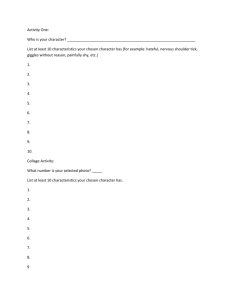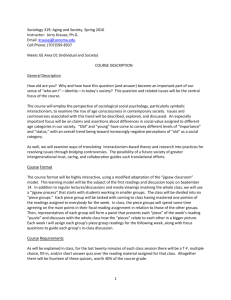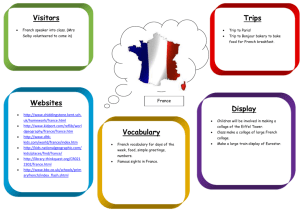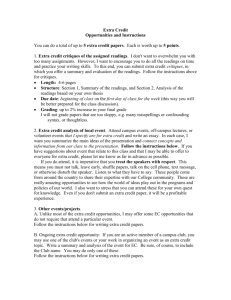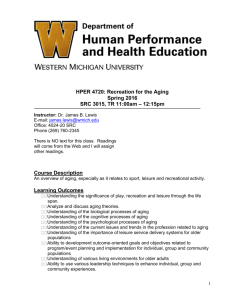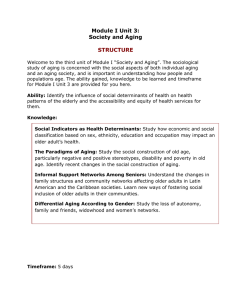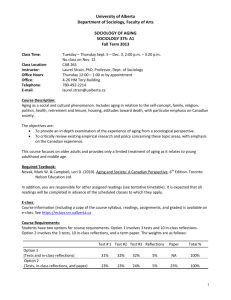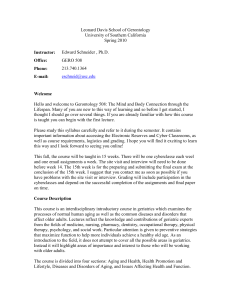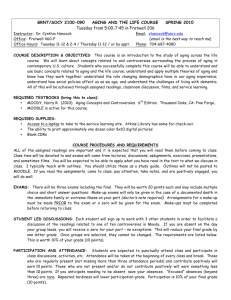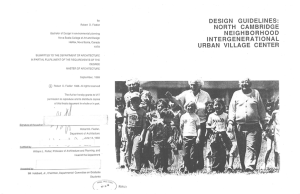UNST 421: Senior Capstone
advertisement
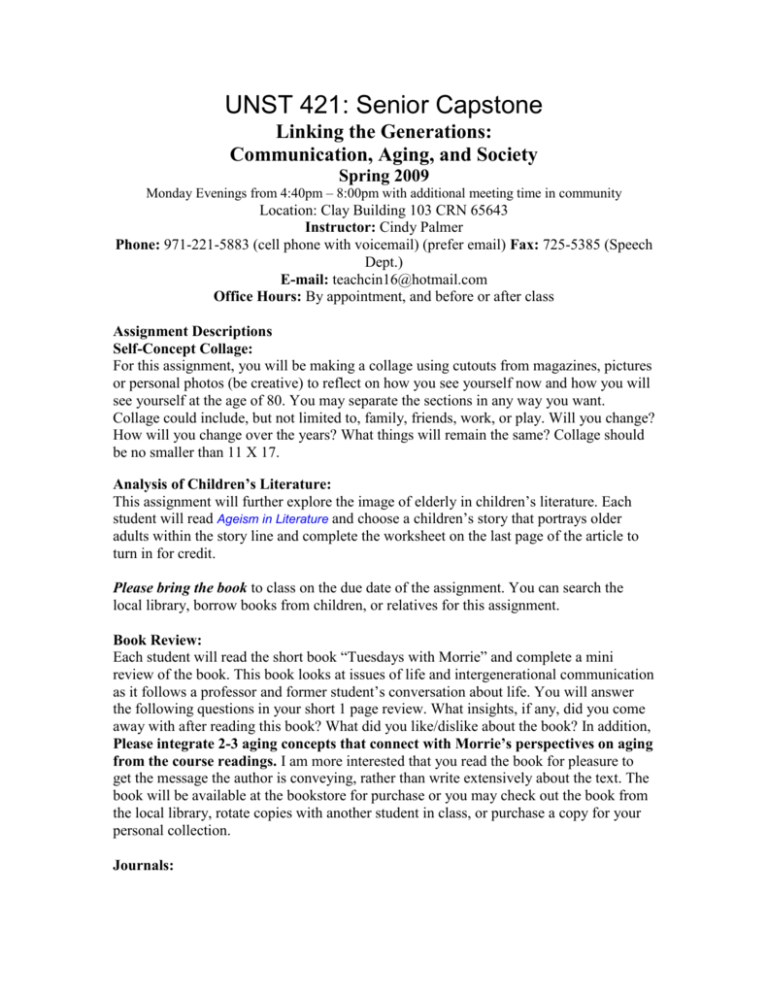
UNST 421: Senior Capstone Linking the Generations: Communication, Aging, and Society Spring 2009 Monday Evenings from 4:40pm – 8:00pm with additional meeting time in community Location: Clay Building 103 CRN 65643 Instructor: Cindy Palmer Phone: 971-221-5883 (cell phone with voicemail) (prefer email) Fax: 725-5385 (Speech Dept.) E-mail: teachcin16@hotmail.com Office Hours: By appointment, and before or after class Assignment Descriptions Self-Concept Collage: For this assignment, you will be making a collage using cutouts from magazines, pictures or personal photos (be creative) to reflect on how you see yourself now and how you will see yourself at the age of 80. You may separate the sections in any way you want. Collage could include, but not limited to, family, friends, work, or play. Will you change? How will you change over the years? What things will remain the same? Collage should be no smaller than 11 X 17. Analysis of Children’s Literature: This assignment will further explore the image of elderly in children’s literature. Each student will read Ageism in Literature and choose a children’s story that portrays older adults within the story line and complete the worksheet on the last page of the article to turn in for credit. Please bring the book to class on the due date of the assignment. You can search the local library, borrow books from children, or relatives for this assignment. Book Review: Each student will read the short book “Tuesdays with Morrie” and complete a mini review of the book. This book looks at issues of life and intergenerational communication as it follows a professor and former student’s conversation about life. You will answer the following questions in your short 1 page review. What insights, if any, did you come away with after reading this book? What did you like/dislike about the book? In addition, Please integrate 2-3 aging concepts that connect with Morrie’s perspectives on aging from the course readings. I am more interested that you read the book for pleasure to get the message the author is conveying, rather than write extensively about the text. The book will be available at the bookstore for purchase or you may check out the book from the local library, rotate copies with another student in class, or purchase a copy for your personal collection. Journals: The journal will enable you to reflect on your progress in the community and understanding of course concepts and theory. Each week you will read the assigned readings and answer the discussion questions provided on the Focus Journal Questions Handout. This should be approximately 1.5 pages (double spaced) in length. Although you will only be required to respond to 1 journal question in your journal per week, you are required to be prepared to answer the rest of them in a class discussion. You may use part of this space to also reflect on the previous week’s class discussion. In addition, you will also address in 1-2 paragraphs your current status with your project in the community with each journal assignment. Please be prepared to report on the status of your project at each class period. One entry is due according to the timeline schedule. Address the following questions if you need a place to start. �What was duration and nature of the work or activity? �What was the best and worst part of the work? Why? �If I was in charge of this project or class, how would I have changed it to make it more effective, productive, interesting? �Who did you work with? What were they like? What did you learn from them? What did you have to offer them? �What did you do or learn that relates to the course content? �How can you relate the service projects to the class activities or vice versa? �What project-related topics would you like to discuss in class? �What personal skills or traits help you to be effective in this project? �What personal skills or traits would you like to develop further? �How does this project/course affect my life goals? Discussion Leader: A pair of students will sign up for each week of the quarter to lead the discussion. Each student read the assigned chapter listed under discussion leader. You will divide up the chapter, read and summarize the key points in class and create 4 questions each for the class to begin the discussion of topics. Questions can be a combination of the course readings and your selection. Questions should be thought-provoking and “open” in nature, allowing classmates to expand on ideas presented…”How do you feel about…? “Or how would you approach things differently…?” Turn in typed summary and questions on assigned date for credit. No make ups allowed. Community Project: Based on interest of the community member, we will be completing a variety of projects for the term. Because of the diverse audience, your project may be one of the following or may be designed to fit the needs of your particular partner. With this flexibility, it is important that you determine early on your particular project and approve it with me in advance. Please remember that each older adult is unique and may need the project adapted to fit his or her needs based on the resources available. A component of your grade for the project will be based on a peer evaluation as well. Memory Book: You will be paired with a classmate and a resident at the Cedar Sinai Park. The memory book assignment will allow you to explore the significance of intergenerational memories and stories as told by older adults at the center. This project will include working one-on-one with the older adult, having an ongoing conversation with them about their lives, including significant life events. The written document will be given to the older adult. Everyone has unique life stories and this will document these events for them and their families. Your project can include a collection of photos compiled by you and the older adult throughout the conversation that helps identify items and stories significant to their lives. Photos will be color copied and labeled accordingly. The books may help them recall some details of their past, and help them engage in conversation with staff, family members, or other community members. **Your project may not take the full time required every week. You are expected to spend approximately 5 hours a week working on your community project/volunteering throughout the quarter as this is an intensive Capstone course. You may spend time talking with other people at the center while you visit, and/or help with activities. You will also need to sign in as a volunteer while spending time at the center for Robison’s administrative records and for course requirements. You may also choose to spend time volunteering at Loaves and Fishes to include in overall time experience. Please use the volunteer hours sheet to record your total volunteer hours within and outside of Robison that will go toward your total community time. You will turn in your timesheet from your syllabus at the end of the term. If you feel that you are having a difficult time working around the activities available at the center, contact me early on. It is much more difficult to meet the course requirements if you delay your work in the community. Community Outreach: To explore the aging population in Portland, please do one of the following activities or create one of your own and pass it by me for approval. This activity will entail 2-3 hours of time that may be counted toward your total time in the community. Compare your experience to your experience at Cedar Sinai Park. Option 1: Make arrangements with Loaves and Fishes Meals-on-Wheels program to deliver meals to homebound seniors or volunteer to serve a meal(s) at one of their centers. You probably will have to fill out volunteer paperwork when doing this. Go with a classmate if available and let the program coordinator know you are coming in advance. Write a 1-page summary of your experiences. Option 2: Ask for a tour in advance and visit a nursing home of your choice in Portland or surrounding area (not Robison). Tell us about your impressions of the home. What was the environment like? (be descriptive--lighting, paint on walls, pictures, rooms-shared? 2 or 3 to a room, able to have personal belongings in rooms?, scents, activities schedule, hospital like? home-like? designated room for families to visit in?, staff ratio if available, how much does it cost to live there?.) Address other issues as you see fit. Summary should be 1 page. Option 3: Get activity of your choice approved by instructor. Write a 1-page summary. Presentation: The presentation will include sharing a final copy of the project with your community member on the final night of class, and sharing your project with the class on the last inclass meeting. Your presentation for class should include insight into the intergenerational experience, challenges, rewards, etc. You will hand in 3 separate black and white copies on 8.5 X 11 paper, paper-clipped together of your project to be compiled into a book for the Center. PLEASE DO NOT STAPLE OR BIND YOUR DOCUMENTS. You can use material directly from your written reflection for your presentation. Identify and synthesize how at least 3 course concepts played into your community experience. Written Reflection on Project: After completing your project, you will reflect on your experience by writing a paper on issues that you faced throughout the quarter as applied to communication and aging. Referring back to the journals you keep will facilitate the synthesis of your Capstone experience. What was your success story? What were the challenges? How did you handle the challenges? What were the limitations? What will you take from this experience? In addition, please tie in at least 4 aging concepts and/or theories from your book or readings that directly applied to your experiences in the community. Include any additional insight about the process here in this final reflection. (3-4 pages in length) Expenses: If you have expenses for the project, such as photocopying, supplies, etc., please save all receipts in case we are able to get funds for reimbursements. Reimbursements are very limited. If you choose to purchase supplies different than those provided in the course, it may be difficult to have you compensated for them.
